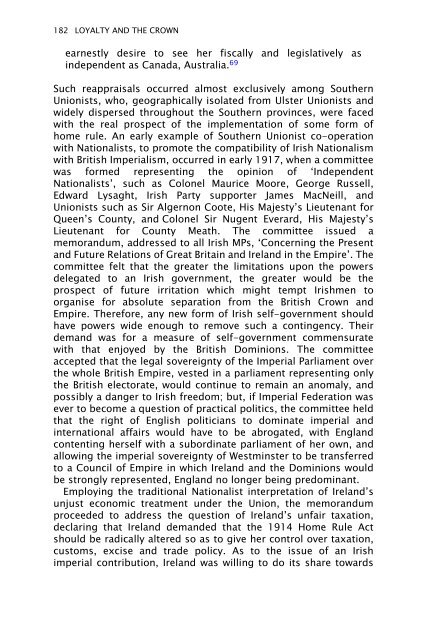Dividing Ireland: World War I and Partition
Dividing Ireland: World War I and Partition
Dividing Ireland: World War I and Partition
Create successful ePaper yourself
Turn your PDF publications into a flip-book with our unique Google optimized e-Paper software.
182 LOYALTY AND THE CROWN<br />
earnestly desire to see her fiscally <strong>and</strong> legislatively as<br />
independent as Canada, Australia. 69<br />
Such reappraisals occurred almost exclusively among Southern<br />
Unionists, who, geographically isolated from Ulster Unionists <strong>and</strong><br />
widely dispersed throughout the Southern provinces, were faced<br />
with the real prospect of the implementation of some form of<br />
home rule. An early example of Southern Unionist co-operation<br />
with Nationalists, to promote the compatibility of Irish Nationalism<br />
with British Imperialism, occurred in early 1917, when a committee<br />
was formed representing the opinion of ‘Independent<br />
Nationalists’, such as Colonel Maurice Moore, George Russell,<br />
Edward Lysaght, Irish Party supporter James MacNeill, <strong>and</strong><br />
Unionists such as Sir Algernon Coote, His Majesty’s Lieutenant for<br />
Queen’s County, <strong>and</strong> Colonel Sir Nugent Everard, His Majesty’s<br />
Lieutenant for County Meath. The committee issued a<br />
memor<strong>and</strong>um, addressed to all Irish MPs, ‘Concerning the Present<br />
<strong>and</strong> Future Relations of Great Britain <strong>and</strong> <strong>Irel<strong>and</strong></strong> in the Empire’. The<br />
committee felt that the greater the limitations upon the powers<br />
delegated to an Irish government, the greater would be the<br />
prospect of future irritation which might tempt Irishmen to<br />
organise for absolute separation from the British Crown <strong>and</strong><br />
Empire. Therefore, any new form of Irish self-government should<br />
have powers wide enough to remove such a contingency. Their<br />
dem<strong>and</strong> was for a measure of self-government commensurate<br />
with that enjoyed by the British Dominions. The committee<br />
accepted that the legal sovereignty of the Imperial Parliament over<br />
the whole British Empire, vested in a parliament representing only<br />
the British electorate, would continue to remain an anomaly, <strong>and</strong><br />
possibly a danger to Irish freedom; but, if Imperial Federation was<br />
ever to become a question of practical politics, the committee held<br />
that the right of English politicians to dominate imperial <strong>and</strong><br />
international affairs would have to be abrogated, with Engl<strong>and</strong><br />
contenting herself with a subordinate parliament of her own, <strong>and</strong><br />
allowing the imperial sovereignty of Westminster to be transferred<br />
to a Council of Empire in which <strong>Irel<strong>and</strong></strong> <strong>and</strong> the Dominions would<br />
be strongly represented, Engl<strong>and</strong> no longer being predominant.<br />
Employing the traditional Nationalist interpretation of <strong>Irel<strong>and</strong></strong>’s<br />
unjust economic treatment under the Union, the memor<strong>and</strong>um<br />
proceeded to address the question of <strong>Irel<strong>and</strong></strong>’s unfair taxation,<br />
declaring that <strong>Irel<strong>and</strong></strong> dem<strong>and</strong>ed that the 1914 Home Rule Act<br />
should be radically altered so as to give her control over taxation,<br />
customs, excise <strong>and</strong> trade policy. As to the issue of an Irish<br />
imperial contribution, <strong>Irel<strong>and</strong></strong> was willing to do its share towards








